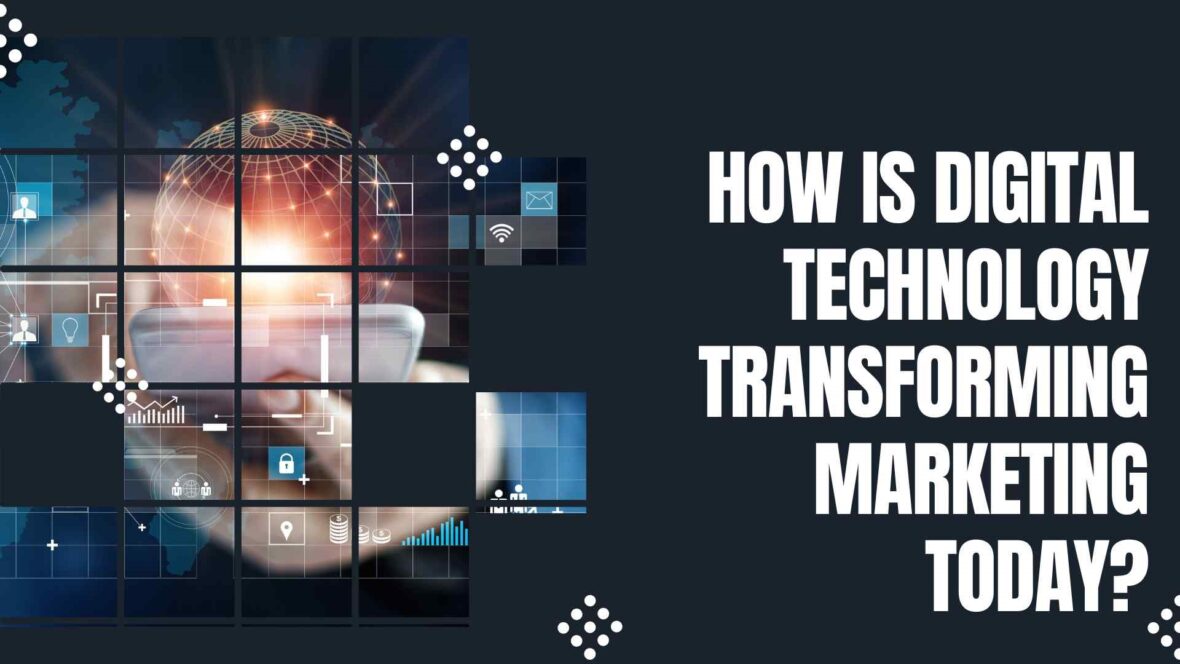Digitization and technological advancements have rapidly increased in recent times. It has rendered countless industries more efficient and successful. The marketing industry is no exception. Most people tend to focus on the speed factor of digital technology. However, they overlook its social impact entirely. Digital Technology has revolutionized the world to an extent where online connectivity plays a pivotal role. Simply speaking, it has dramatically upgraded the landscape of the marketing industry today.
Digital transformation has resulted in the formation of multiple essential tools. It has become easier for businesses to analyze metrics such as audience interaction. This helps to create new marketing opportunities. It is no longer a hidden fact that modern digital technology has grown to become a powerful marketing tool.
What is meant by Digital transformation in the marketing industry?
The term ‘digital transformation’ means incorporating modern digital technologies into the marketing field. This helps to boost the sales of goods, products and services. It overlooks the following things:
- Analyzing and understanding the customer behavior and needs.
- Tailored and data-driven marketing. It involves interacting with the right customers in the right way and at the proper time.
- Improving customer experience with fast-paced services and specific recommendations catered to their needs.
The significance of digital transformation in the marketing industry
Integrating digital technology in industries has become crucial due to the ever-growing competition. In modern times, people have better access to countless businesses. The internet has transformed the business industry into a virtual pool. Customers can avail themselves of different services anytime, anywhere. This means that there is always neck-to-neck competition in the industry. This is why individual businesses need to stand out in multiple aspects. This includes the products and services provided and the level of customer experience. However, there is no need to worry. Businesses can conduct their operations smoothly with the help of modern digital technology. Digital tools serve a dual purpose. They enhance marketing by providing a better customer experience. They also help in business growth and development.
Digital technology and analytical tools help businesses get valuable insights into customer behavior. They can obtain and use customer data through multiple sources. This includes their purchase histories, visited websites, mobile applications, and social media history. Besides these, direct feedback is also important. This, in turn, helps them develop efficient marketing strategies accordingly. Thus, digital technology’s data-driven approach is very important and relevant in today’s market. It helps to cater to everyone’s needs and devise efficient solutions.
Ways in which digital technology has influenced marketing
Digital marketing funnel
A digital marketing funnel is a hierarchy that includes five steps. It represents customer psychology as they go through one’s business page. The multiple levels showcase their entire journey. It begins from the business site discovery to the final purchase of goods or services. Marketers use the digital marketing funnel method to analyze potential customers’ behavioral patterns and implement effective sales and growth strategies.
There are mainly five steps involved. They are listed below:
- Discovery or awareness: This is the first stage. A potential customer comes across a business page and its services for the first time.
- Displaying interest: This is the second stage. Potential customers go through the brand website. This includes the landing page, blogs, and so on.
- Evaluation: After getting a brief idea of the services, they further evaluate the business page. They research more about it on third-party sites and competitor websites.
- Intent: This is the step before the final purchase. The potential customers seriously consider buying the products or services after completing the evaluation.
- Purchase: This is the final stage. The potential customer buys the products or services after being convinced about their worth.
Before digital technology’s emergence, the marketing funnel was a simple and routine procedure. Businesses developed random strategies and just hoped for the best. However, digital transformation has improved the position of businesses to a considerable extent. They now have better control with innovative tools. This includes Business analytics, interactive tools and many more.
Personalizing content
Personalization is one of the major feats of digital technology in marketing. Many digital marketing tools have emerged lately. These allow users to personalize the content as per the respective customer.
Marketing tools such as interactivity and metrics help track and analyze customer behavior and actions. This data helps to carry out effective marketing strategies. For instance, businesses can offer similar products based on the customer’s previous purchases. The best place to do so is social media. Platforms such as Instagram, Facebook, and so on have recently become a cultural hub. Analyzing people’s behavioral patterns here helps to determine their interests and preferences. With this information at hand, businesses can implement favorable strategies. For example, they can draft customized emails to establish customer value.
Gone are the days when marketers needed to guess the customer’s interests. The evolution of digital technology has made the marketing process very easy. One can work on providing the best customer service and experience with ease.
Data-driven approach
The traditional marketing system was ineffective due to the absence of high-quality data. Data availability is a critical factor. Marketers mostly base their decisions on customer data. A typical example of traditional marketing includes subway posters or television commercials. There was no way to track the audience’s reaction to them. Thus, businesses could not get the required information, such as how many people saw them or bought the respective goods or services because of them.
The advancements in digital technology have eliminated all these issues. The analytics tool’s invention has completely changed the marketing landscape. Not only is it relevant in today’s market, but also beneficial for all future marketing needs. Now, businesses can easily create strategies and content suited to customer needs.
Choosing the right content creation tool is the next important step after this. Commercial videos on platforms such as Instagram and YouTube have recently gained momentum. This is important to determine viewers’ rate of conversion. Thus, businesses need to put much effort into content and video creation. However, there is no need to worry. Even non-tech-savvy professionals can create and edit a video online using different editing tools. Thus, we recommend you choose the tools after careful consideration.
Moreover, features such as the ‘Call to Action’ button are also an efficient way to promote viewer conversion. This feature reveals much essential information. This includes which is the most popular social media platform. Businesses can also determine the peak engagement time and many more. Thus, the data-driven approach has been designed to suit the consumer’s needs.
Interactive marketing
Digital technology has vastly improved the level of connectivity and interaction globally. Unlike traditional media, digital media offers consumers more choices and greater control.
For example, business websites are designed in a user-friendly way. Viewers can locate specific information with ease. Moreover, the emergence of social media platforms has also resulted in transparent communication. People can now inquire about the services directly to the company. The company, too, can provide timely responses. This helps in customer conversion and retention. Customers can also give positive or negative feedback depending on their experience. Innovative and interactive features such as thumbs up, favorite, save and comment sections help in this process.
The upgrade in business-consumer interaction through digital transformation has completely revolutionized the industry. Another example includes live streams and advertisements. Here, social media influencers discuss and promote a product or service. Thus, it is targeted at a large group of people. Besides viewing, people can also engage in various discussions. They can comment, provide suggestions, recommendations, feedback and so on. This brings brand awareness to countless people so that they make informed decisions. Digital transformation has completely changed how marketers advance toward their target customers.
Automation technology
Time plays a critical role in a customer’s purchasing decisions. Sometimes, they perform all the necessary steps like choosing and putting products in shopping carts. However, they opt out before the final purchase.
Automation tools, along with metrics, help to track customer behavior. Thus, a person does not need to supervise it all the time. This reduces manual errors. Moreover, it helps to identify consumer behavioral traits such as the one above. This timely identification helps businesses to devise solutions to counteract losses. The time-sensitive actions trigger the automation software, which in turn drafts personalized emails and responses to the consumer.
Automation technology has also been incorporated into chats. Thus, it has replaced manual customer service. This ensures timely responses to customers, which increases business productivity.
Conclusion
Thus, it can be concluded that digital transformation is a progressive movement. It has effectively seeped into every aspect of the business and marketing industry. The advantages of digital transformation have helped to unify the global market. Keeping up with technological and digital advancements is important in the present age. Its absence will lead to business dissolution.






